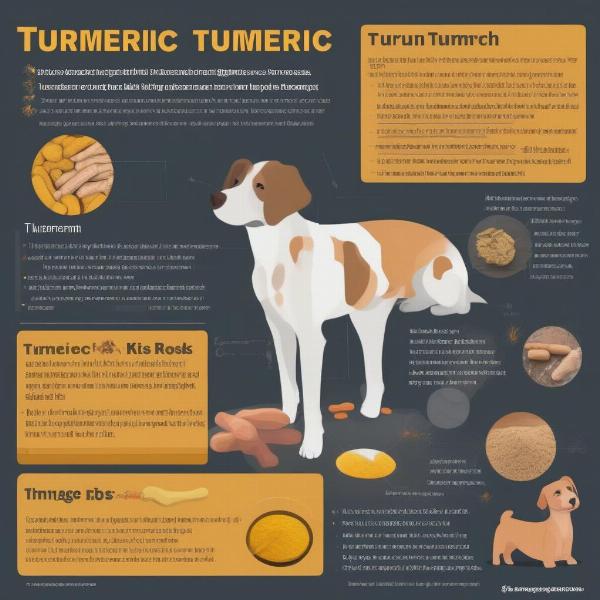Turmeric powder for dogs has gained popularity as a natural supplement. This golden spice, commonly used in curries, boasts potential health benefits thanks to its active compound, curcumin. However, it’s essential to understand how to use turmeric powder safely and effectively for your furry friend. This article will delve into the benefits, risks, and best practices for using turmeric powder for dogs.
Understanding the Potential Benefits of Turmeric for Dogs
Curcumin, the active ingredient in turmeric, is a potent antioxidant and anti-inflammatory. These properties can be beneficial for dogs dealing with:
- Osteoarthritis and Joint Pain: Turmeric may help reduce inflammation and pain associated with arthritis, improving mobility and comfort.
- Allergies: Curcumin can help modulate the immune system and reduce allergic reactions in some dogs.
- Inflammatory Bowel Disease (IBD): The anti-inflammatory properties of turmeric may help soothe the digestive tract in dogs with IBD.
- Cancer: Some studies suggest curcumin may have anti-cancer properties, though more research is needed in dogs.
- Cognitive Function: Turmeric may have neuroprotective effects and potentially improve cognitive function in older dogs.
Risks and Precautions When Using Turmeric Powder for Dogs
 Turmeric powder risks for dogs
Turmeric powder risks for dogs
While turmeric offers potential benefits, it’s crucial to be aware of potential risks and use it cautiously:
- Stomach Upset: Turmeric can cause digestive issues like diarrhea or vomiting, especially in high doses.
- Allergic Reactions: Some dogs may be allergic to turmeric.
- Medication Interactions: Turmeric can interact with certain medications, such as blood thinners. Always consult your veterinarian before giving your dog turmeric, especially if they are on other medications.
- Low Bioavailability: Curcumin is poorly absorbed by the body. Combining turmeric with black pepper (piperine) and a healthy fat source can enhance absorption.
How to Use Turmeric Powder for Dogs Safely
Always consult your veterinarian before adding turmeric to your dog’s diet. They can help you determine the appropriate dosage and assess any potential risks based on your dog’s individual health conditions and medications.
- Start with a small dose: Begin with a very small amount of turmeric and gradually increase the dosage as tolerated.
- Mix with food: Add turmeric powder to your dog’s food.
- Golden Paste: Golden paste, a mixture of turmeric, water, black pepper, and a healthy fat (like coconut oil), is a popular way to administer turmeric to dogs.
- Supplements: Turmeric supplements formulated specifically for dogs are also available. Ensure they are from a reputable source and follow the dosage instructions carefully.
Is Turmeric Right for Your Dog?
The decision to use turmeric for your dog should be made in consultation with your veterinarian. They can help you weigh the potential benefits against the risks and determine if it’s a suitable supplement for your dog’s individual needs.
Conclusion
Turmeric powder offers potential health benefits for dogs, including anti-inflammatory and antioxidant effects. However, it’s essential to use it cautiously and consult your veterinarian before adding it to your dog’s diet. By following the guidelines outlined in this article, you can help ensure your furry friend receives the potential benefits of turmeric safely and effectively.
FAQ
- How much turmeric can I give my dog? The appropriate dosage varies depending on your dog’s size and health condition. Always consult your veterinarian for guidance.
- Can I give my dog turmeric every day? While daily use is generally safe in appropriate doses, it’s best to discuss the long-term use of turmeric with your veterinarian.
- What are the signs of a turmeric allergy in dogs? Allergic reactions can include itching, hives, vomiting, and diarrhea.
- Can I use human turmeric supplements for my dog? It’s best to use turmeric supplements formulated specifically for dogs to ensure appropriate dosage and safety.
- How long does it take to see results from turmeric in dogs? It may take several weeks or even months to see noticeable improvements.
- Can I give my dog turmeric if they are pregnant or nursing? Consult your veterinarian before giving turmeric to pregnant or nursing dogs.
- Are there any alternatives to turmeric powder for dogs? Other natural supplements with anti-inflammatory properties include fish oil and ginger. Discuss these options with your veterinarian.
ILM Dog is a leading international online resource dedicated to providing expert advice on dog care and wellbeing. From breed selection to health and nutrition, training, and grooming, we offer valuable insights and practical tips for dog owners worldwide. For further assistance on canine health, nutrition, or any other dog-related query, reach out to our team of experts. Contact us via email at [email protected] or call us at +44 20-3965-8624. ILM Dog is committed to supporting you and your canine companion on every step of your journey together.